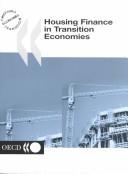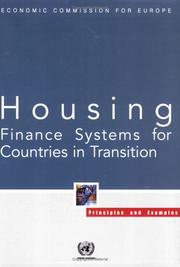| Listing 1 - 10 of 81 | << page >> |
Sort by
|
Book
Year: 1695 Publisher: [London : s.n.,
Abstract | Keywords | Export | Availability | Bookmark
 Loading...
Loading...Choose an application
- Reference Manager
- EndNote
- RefWorks (Direct export to RefWorks)
eebo-0018
Taxation --- Housing, finance --- Windows
Book
Year: 2016 Publisher: Washington, D.C. : The World Bank,
Abstract | Keywords | Export | Availability | Bookmark
 Loading...
Loading...Choose an application
- Reference Manager
- EndNote
- RefWorks (Direct export to RefWorks)
Using a partially constructed panel database of 48 Sub-Saharan African countries from 2000 to 2013, this paper analyzes the structure of housing finance in Africa, its determinants, and its impact on inclusive growth. The findings show that market capitalization and urbanization are key positive determinants of housing finance, and the post-conflict environment is conductive to greater housing finance development. This result suggests that housing finance is driven by standard market forces of demand and supply. In addition, the analysis finds that housing finance development in Africa is not yet an effective tool for reducing economic inequality, at its current, very early stage. However, the paper shows that above a given threshold, housing finance could be efficient at reducing inequality. Finally, there is a slightly positive relationship between housing finance and greater economic development in Africa. All these findings suggest that policies to boost housing finance development in Africa would be fruitful in the medium to long terms.
Housing Finance --- Inclusive Growth --- Inequality And Shared Prosperity

ISBN: 1280034920 9786610034925 9264195947 9264196749 Year: 2002 Publisher: Paris Organization for Economic Cooperation and Development
Abstract | Keywords | Export | Availability | Bookmark
 Loading...
Loading...Choose an application
- Reference Manager
- EndNote
- RefWorks (Direct export to RefWorks)
Housing policies of the central and eastern European countries are changing dramatically. Governments as suppliers of housing for the public are being replaced by market mechanisms in the private sector. To facilitate the development of housing markets, establishing well-functioning housing finance systems has emerged as an important policy issue for transition economies. This publication contains selected papers originally submitted to the workshop on housing finance in transition economies organised by the OECD in June 2000. It provides the first in-depth survey of current situations and challenges in the development of housing finance in major transition economies, in particular, the Czech Republic, Estonia, Hungary, Latvia, Lithuania, Poland, the Slovak Republic and Slovenia. It also reviews current trends in housing finance in advanced market countries and their implications for transition economies.
Housing -- Finance -- Europe, Eastern. --- Housing -- Finance -- Former Soviet republics. --- Housing -- Finance. --- Housing --- Business & Economics --- Real Estate, Housing & Land Use --- Finance --- Affordable housing --- Homes --- Houses --- Housing needs --- Residences --- Slum clearance --- Urban housing --- Social aspects --- City planning --- Dwellings --- Human settlements --- Logement --- Finances
Book
Year: 2018 Publisher: Washington, D.C. : The World Bank,
Abstract | Keywords | Export | Availability | Bookmark
 Loading...
Loading...Choose an application
- Reference Manager
- EndNote
- RefWorks (Direct export to RefWorks)
The global housing deficit in both developed and developing countries is increasing - driven by demographic and other mega-trends including urbanization and income inequality. Global pension fund assets, on the other hand, are both growing and increasingly looking for long-term, productive investments. There are multiple avenues through which pension funds can invest in the housing sector.
Book
Year: 2018 Publisher: [Washington, D.C.] : Office of Inspector General, Department of the Treasury,
Abstract | Keywords | Export | Availability | Bookmark
 Loading...
Loading...Choose an application
- Reference Manager
- EndNote
- RefWorks (Direct export to RefWorks)
Low-income housing --- Law and legislation --- Finance. --- United States. --- New Hampshire Housing Finance Authority --- Auditing.
Book
ISBN: 1601384548 Year: 2007 Publisher: : Atlantic Publishing Group,
Abstract | Keywords | Export | Availability | Bookmark
 Loading...
Loading...Choose an application
- Reference Manager
- EndNote
- RefWorks (Direct export to RefWorks)
For years the traditional way to finance a real estate purchase was with a 5-20 percent down payment. Investing in real estate in this manner was a slow go, but things have changed with the release of this new book. There are now hundreds of different methods for creatively financing your real estate investments. Smart investors know the secrets to using other people's money to finance their investments and now for the first time you can learn how to buy houses, lots, land, and commercial properties for nothing down and in some cases even receive cash back at the closing. These truly effecti
Housing -- Finance. --- Mortgages. --- Real estate business -- Finance. --- Real estate investment -- Finance. --- Real estate investment --- Finance
Book
Year: 2020 Publisher: Washington, D.C. : The World Bank,
Abstract | Keywords | Export | Availability | Bookmark
 Loading...
Loading...Choose an application
- Reference Manager
- EndNote
- RefWorks (Direct export to RefWorks)
The Central African Economic and Monetary Community (CEMAC), which consists of Cameroon, the Central African Republic, Chad, the Republic of Congo, Equatorial Guinea, and Gabon, is one of the oldest regional groupings in Africa. Urbanization and growing population will put increasing pressure on existing housing resources. Without a step change in the level of housing construction and the necessary long-term finance to invest, slums will proliferate as short-term solutions fill the gap. The State is often the biggest actor in the sector with programs which are often costly and ineffective. CEMAC's housing value chain displays high levels of dysfunction on both demand and supply sides. The enabling environment creates significant challenges in addressing the affordable housing challenge. A comprehensive and far reaching program of reforms will be needed across multiple sectors to create the conditions under which private sector investment can thrive and be properly channeled into housing investment. Lack of long-term finance is a key constraint preventing long term investment into housing. This report focuses on the road map and recommendations for development of housing in the CEMAC region.
Finance and Financial Sector Development --- Gender --- Housing --- Housing Finance --- Refinancing --- Urban Development --- Urban Governance and Management --- Urban Housing

ISBN: 9211169232 1423727223 9789211169232 Year: 2005 Publisher: New York: United Nations,
Abstract | Keywords | Export | Availability | Bookmark
 Loading...
Loading...Choose an application
- Reference Manager
- EndNote
- RefWorks (Direct export to RefWorks)
Housing --- Housing policy --- Mortgage loans --- Finance --- Government policy --- Finance&delete& --- Transition economies --- E-books --- Housing policy. --- Mortgage loans. --- Business & Economics --- Real Estate, Housing & Land Use --- Home loans --- Mortgage lending --- Real estate loans --- Loans --- Secondary mortgage market --- Affordable housing --- Homes --- Houses --- Housing needs --- Residences --- Slum clearance --- Urban housing --- City planning --- Dwellings --- Human settlements --- Housing and state --- State and housing --- Social policy --- Home finance --- Housing finance --- Finance. --- Government policy. --- Social aspects --- Housing - Finance --- Housing - Finance - Government policy
Book
ISBN: 9781509523252 1509523251 9781509523269 150952326X 1509523294 Year: 2019 Publisher: Medford, Mass.: Polity press,
Abstract | Keywords | Export | Availability | Bookmark
 Loading...
Loading...Choose an application
- Reference Manager
- EndNote
- RefWorks (Direct export to RefWorks)
"Leading economist Josh-Ryan Collins argues that to understand the housing crisis, we must examine the 'doom loop' that exists between private home ownership and a lightly regulated commercial banking system. The only way out is to rethink how we structure our tax and financial systems and accept that home ownership may not always be the solution"-- "Throughout the western world, a whole generation is being priced out of the housing market. While wages and incomes continue to stagnate for the majority, house prices and rents remain staggeringly high. For millions of people, particularly millennials, the basic goal of acquiring decent, affordable accommodation is a distant dream. In this compelling book, leading economist Josh-Ryan Collins argues that to understand this crisis, we must examine a crucial paradox at the heart of modern capitalism. Two of the key ingredients of contemporary capitalist societies, private home ownership and a lightly regulated commercial banking system, are not mutually compatible. Their interaction leads to a doom loop in which unlimited credit and money flows into an inherently finite supply of viable property, resulting in ever higher house prices. The result is declining levels of home ownership, rising inequality and debt, stagnant growth and financial instability. The only way out of this vicious circle is to radically rethink how we structure our tax and financial systems and accept that home ownership may not always be the solution. This engaging and topical book will be essential reading for anyone who wants to understand why they cant find an affordable home, and what we can do about it"--
Housing --- Mortgage banks. --- Banks and banking. --- Prices. --- Finance. --- Mortgage banks --- Banks and banking --- Prices --- Finance --- Capitalism --- Finance, Personal. --- Home ownership. --- Social aspects. --- Housing - Prices --- Housing - Finance
Book
ISBN: 9781138950580 9781315668666 9781317361770 9781317361787 9781138092907 Year: 2016 Publisher: London Routledge, Taylor & Francis Group
Abstract | Keywords | Export | Availability | Bookmark
 Loading...
Loading...Choose an application
- Reference Manager
- EndNote
- RefWorks (Direct export to RefWorks)
Due to the financialization of housing in today’s market, housing risks are increasingly becoming financial risks. Financialization refers to the increasing dominance of financial actors, markets, practices, measurements and narratives. It also refers to the resulting structural transformation of economies, firms, states and households. This book asserts the centrality of housing to the contemporary capitalist political economy and places housing at the centre of the financialization debate. A global wall of money is looking for High-Quality Collateral (HQC) investments, and housing is one of the few asset classes considered HQC. This explains why housing is increasingly becoming financialized, but it does not explain its timing, politics and geography. Presenting a diverse range of case studies from the US, the UK, the Netherlands, Germany, Italy and Spain, the chapters in this book include coverage of the role of the state as the driver of financialization processes, and the part played by local and national histories and institutions. This cutting edge volume will pave the way for future research in the area. Where housing used to be something "local" or "national", the two-way coupling of housing to finance has been one crucial element in the recent crisis. It is time to reconsider the financialization of both homeownership and social housing. This book will be of interest to those who study international economics, economic geography and financialization.
Housing --- Home finance --- Housing finance --- Finance. --- Sociology of environment --- Land. Real estate --- Economic geography --- real estate --- housing [concept] --- Finance --- Economic aspects.
| Listing 1 - 10 of 81 | << page >> |
Sort by
|

 Search
Search Feedback
Feedback About UniCat
About UniCat  Help
Help News
News